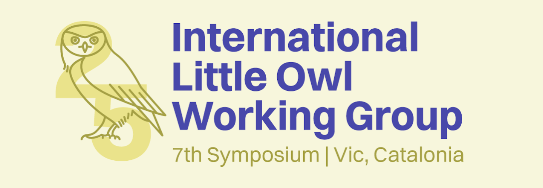Setè Simposi Internacional del Mussol Comú

20-23 de març del 2025 a Vic, Barcelona
El comitè organitzador convida investigadors i entusiastes del mussol comú a participar en una nova trobada internacional. Aquest esdeveniment té diversos propòsits: és una oportunitat de fer visibles les iniciatives més recents portades a terme a casa nostra, conèixer els darrers treballs realitzats a prop d’una desena de països europeus, celebrar el 25è aniversari del grup internacional d’estudi del mussol (International Little Owl Working Group) i també promoure el debat sobre les estratègies per encarar els reptes de conservació i recerca. La trobada tindrà una durada de quatre dies. Començarà la tarda del dijous 20 de març, moment en què es rebrà els assistents internacionals i s’acabarà de formalitzar la inscripció. Les sessions del divendres i dissabte seran de presentacions orals a la Universitat de Vic.
Diumenge dia 23 es farà una sortida amb autobús a la reserva de mussols d’Osona per conèixer in situ les millores de conservació aplicades i, finalment, es clourà la trobada amb un dinar per a tots els participants.
La inscripció és parcialment subvencionada. El cost de 130 euros cobreix els àpats principals dels quatre dies més despeses logístiques i de materials (allotjament a part). S’ofereix un preu especial de 65 euros per a qui assisteixi només un dia al simposi. L’esdeveniment compta amb el suport de l’Ajuntament de Vic, el Grup de Naturalistes d’Osona i l’Institut Català d’Ornitologia.
Formulari de registre: https://forms.gle/gi1dxn6w3kpVcMJf6
Les presentacions seran en anglès i no es comptarà amb traducció simultània.
Si teniu qualsevol consulta, podeu contactar amb Jordi Baucells (jbaucells@biodiversitat.cat) o Hugo Framis (hugoframis@gmail.com).
Comitè organitzador: Jordi Baucells, Dries Van Nieuwenhuyse i Hugo Framis.
Novetats a les publicacions de l’ICO
 Ja podeu consultar el número 61 (hivern 2024-25) de l’Abellerol:
Ja podeu consultar el número 61 (hivern 2024-25) de l’Abellerol:https://ornitologia.org/mm/file/queoferim/divulgacio/publicacions/abellerol/abellerol61.pdf
Conté un article sobre la conservació de l’arpella cendrosa, un reportatge sobre una estació d’anellament en una finca d’oliveres a les Garrigues i un llarg obituari sobre el nostre company David Bigas, a més de la secció de ressenyes bibliogràfiques.
La versió en paper d’aquest número ja s’ha enviat als socis i sòcies que el van demanar i el rebreu durant aquests dies.
Pel que fa a la Revista Catalana d’Ornitologia, lamentem comunicar-vos que arrosseguem un endarreriment i el volum 40 (2024) no estarà disponible fins a finals de febrer. Aprofitem l’ocasió per informar-vos que aquest volum és el darrer que publiquem en paper, ja que a partir de 2025 la revista passa a ser només d’edició electrònica.

NIT DE CONCERTS

T’imagines tenir a la Chenoa, Manel, Abba, Nathy Peluso i La Gossa Sorda en un mateix escenari?
Doncs no els tindràs. Però sí que et portem aquesta proposta amb 3 concerts de versions per passar unes quantes hores gaudint de música en directe al teatre de l’Espiga de Les Corts.
Iniciarem la nit amb el Roger Vilà fent unes versions de proximitat amb la guitarra. Serà ell mateix que en els canvis ens farà de mestre de cerimònies i, per tant, qui presentarà al primer duo de la nit: Irene Miras i Juan Ise. Que ens faran ballar i gaudir a parts iguals abans de donar pas als Underhead Covers, amb qui cantarem a ple pulmó i ballarem fins a netejar tota la pista.
Com sempre tindrem menjar i beguda al bar a preus populars obert des d’una hora abans que comenci l’esdeveniment, és a dir des de les 18:30h.
Apunteu el dia 25 de gener a la vostra agenda ja! Ens veiem!
Ja podeu aconseguir les vostres entrades Aquí.

TOC-TOC

Arriba al nostre escenari «Toc Toc», una comèdia que et farà riure fins a plorar!
Sis personatges amb trastorns obsessius-compulsius (TOC) es troben a la consulta d’un psiquiatre… Comença així una situació hilarant plena de malentesos, confessions inesperades i un munt d’humor.
No et perdis aquesta obra que ha triomfat a tot arreu i que ara arriba al nostre teatre. Vine a gaudir d’una nit de rialles i diversió!
L’obra té una durada de 140mins (inclòs un entreacte).
Ja et pots fer amb les teves entrades Aquí.
El cercavores, un habitant dels cims muntanyencs
 El cercavores prefereix viure als cims de les muntanyes i en espais oberts. Per aquest motiu, el Projecte Cercavores centra la seva activitat en dos cims del Parc Natural del Montseny: el Turó de l’Home i les Agudes. El projecte va començar a mitjans de novembre i finalitzarà a mitjans de febrer.
El cercavores prefereix viure als cims de les muntanyes i en espais oberts. Per aquest motiu, el Projecte Cercavores centra la seva activitat en dos cims del Parc Natural del Montseny: el Turó de l’Home i les Agudes. El projecte va començar a mitjans de novembre i finalitzarà a mitjans de febrer.Monitorització i anellament: entendre les seves migracions hivernals
L’objectiu principal del projecte és monitoritzar el nombre de cercavores al Turó de l’Home i a les Agudes, buscar els ocells anellats per saber durant quants anys tornen. La monitorització ens ajuda a comprendre quants individus passen l’hivern a la zona, mentre que l’anellament permet identificar si es tracta dels mateixos individus que tornen any rere any. A més, s’estudia el seu comportament alimentari comptant les vegades que picotegen diverses fonts d’aliment, com plantes, roques, terra, insectes, llavors, excrements de cabra i ovella, o fonts d’aliment humanes. Aquestes dades ens ajuden a identificar els seus requisits per a l'alimentació i quines són les seves fonts d’aliment durant l’hivern. En conjunt, aquestes informacions proporcionen dades clau sobre la qualitat i la idoneïtat del seu hàbitat.
Observació d’altres espècies rares a la zona
A banda d’estudiar els cercavores, també es presta atenció a altres espècies d’ocells que podrien ser observades a la zona, com el pardal d'ala blanca, el sit blanc, la merla de pit blanc, el tord ala-roig i la griva cerdana.
Primeres troballes
Com que el projecte encara està en curs, no disposem de resultats definitius. Tot i això, les primeres troballes indiquen que s’han registrat més cercavores al Turó de l’Home que a les Agudes. Només s’ha observat un individu anellat fins ara: el 06J, anellat el 2019, que ha tornat durant cinc anys consecutius. Curiosament, les observacions inicials mostren que els cercavores passen la major part del temps picotejant plantes, roques o a terra, més que excrements o fonts d'aliments més artificials (com molles d'entrepans). Tot i que és difícil determinar exactament què mengen, registrar on passen el temps i la quantitat de temps que dediquen a picotejar proporciona informació valuosa sobre el seu comportament alimentari i l’ús de l’hàbitat.






